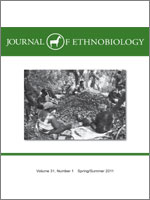Local ecological knowledge (LEK) offers a broad range of information that conservationists, development practitioners, non-governmental organizations, and researchers value greatly. However, LEK has an intrinsic value to its holders; it represents their capacity to adapt and survive in remote areas, while anchoring their cultural continuity within a specific ecological region. The authors set out to describe in this essay the ethnobotanical knowledge of sarrapia (Dipteryx odorata [Aubl.] Willd.) or tonka bean among the inhabitants of three non-indigenous communities of the Lower Caura River Basin, southern Venezuela. The results of this study suggest that there is a strong association between the livelihood of the Caura's residents and the consecutive annual cycle of this species. This association is demonstrated by how the locals: 1. make interconnections between the biological cycle of sarrapia and climatic and ecological variables; 2. discriminate between wild and cultivated sarrapia tree stands; 3. provide accurate estimates on the total production of sarrapia beans per tree stand every year; 4. implement the appropriate skills throughout the delicate process of extracting and treating the beans; and 5. regulate the access and usufruct rights to the wild and cultivated sarrapia trees.
How to translate text using browser tools
1 March 2011
Ethnobotanical Knowledge of Sarrapia (Dipteryx odorata [AUBL.] WILLD.) Among Three Non-Indigenous Communities of the Lower Caura River Basin, Venezuela
Berta E. Pérez,
Tamia Souto
ACCESS THE FULL ARTICLE
It is not available for individual sale.
This article is only available to subscribers.
It is not available for individual sale.
It is not available for individual sale.

Journal of Ethnobiology
Vol. 31 • No. 1
Spring/Summer 2011
Vol. 31 • No. 1
Spring/Summer 2011
Caura River
Dipteryx odorata
Ethnobotanical knowledge
non-indigenous




